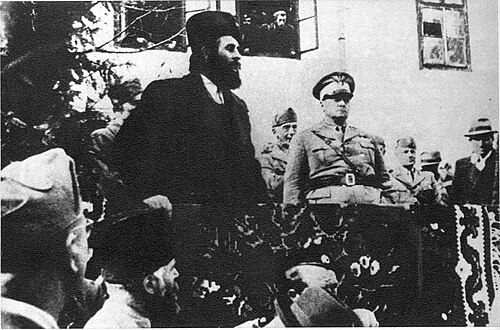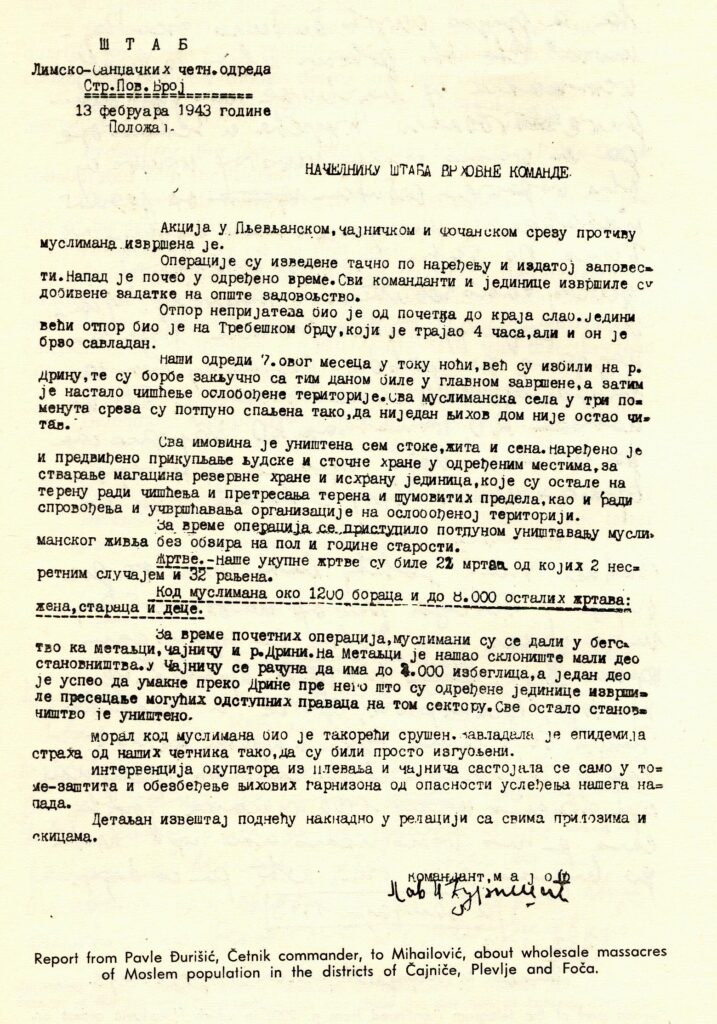Civil society organizations and civic activists express deep concern and strongly condemn the statements made by Metropolitan Joanikije of Montenegro and the Littoral, in which he glorifies Pavle Đurišić – commander of the Chetnik movement in Montenegro and a proven war criminal. Metropolitan Joanikije made these remarks during recent religious ceremonies in Podgorica honoring the victims of Jasenovac, as well as in the territory of Republika Srpska, an entity in Bosnia and Herzegovina.
By calling Đurišić a “great hero” and a man of “invincible character,” Metropolitan Joanikije ignored well-documented historical records that unequivocally confirm Đurišić’s collaboration with fascist and Nazi occupiers, and his responsibility for mass atrocities and the ethnic cleansing of Muslim civilians. Such statements not only insult the memory of victims, but also represent a dangerous attempt at historical revisionism, serving modern-day political and identity-based manipulation.
In light of ongoing distortions of this kind, we remind the public of well-documented facts from Pavle Đurišić’s biography to prevent further rewriting of history.
In January 1942, Chetnik units under his command, with the help of Italian troops, attacked Partisans near Berane. A month later, alongside Ustaša units, they participated in attacks near Foča.
On 23 February 1942, upon entering Kolašin, Đurišić’s Chetnik detachments established the notorious Kolašin prison, where around 2,000 captured Partisans were tortured. In a single execution at Breza, 74 were shot. The prison remained operational until 13 May 1943.
In August 1942, Đurišić formally submitted to Italian fascist command. “Your stance toward the occupier must be loyal and aligned exactly according to the orders of this command. You must not undertake any actions without first informing their (i.e., the Italian) command about them”, states the order he sent to all his units on 30 August 1942.
Under the orders from Draža Mihailović, Đurišić’s Chetniks carried out ethnic cleansing of Muslim populations in northern Montenegro. The first massacres began on 28 November 1942 in Bukovica near Pljevlja, followed by a campaign of terror on 4–5 January 1943 in Pljevlja, Sjenica, Peć, and Kolašin. According to Đurišić’s own report, from 4 to 10 January 1943, 400 men and 1,000 women and children were killed, and 33 villages were burned.
The next phase began on 29 January 1943, focused on Pljevlja, Čajniče, and Foča. The bloodiest operations occurred between 4 and 7 February 1943. On 13 February, Đurišić reported to Mihailović that 1,200 armed men and about 8,000 women, elderly people, and children had been killed in the operation.
According to a report by the Montenegrin State Commission for Investigating Crimes of Occupiers and Their Collaborators, in just the area around Pljevlja in February 1943, 1,352 people were killed – 245 adult men and 1,107 women and children. The report describes atrocities including that “90% of victims were tortured before being killed, stabbed with knives, women raped, often by as many as fifty Chetniks, and then thrown into their homes and burned alive.” In the Pljevlja area, 127 villages and hamlets were destroyed, 1,508 homes and 4,484 auxiliary buildings were burned down.
From 1943 onward, Đurišić openly collaborated with Nazi Germany. His so-called “heroism” included the 23 July 1944 execution of 52 members of the Communist Party of Yugoslavia and its youth organization (SKOJ) in the village of Lazine near Danilovgrad.
In recognition of his loyalty to the Nazis, Pavle Đurišić, as a Chetnik commander and a lieutenant colonel under General Nedić – was awarded the Iron Cross, the highest military decoration of Nazi Germany, on 11 October 1944, granted only with Adolf Hitler’s approval.
In March 1945, he clashed with Draža Mihailović and formed an alliance with collaborator Sekula Drljević. A quarrel soon erupted between them, which was exploited by the Ustaša. Đurišić was subsequently betrayed and killed in the Jasenovac concentration camp – by his former allies.
In a democratic and civilized society, religious leaders and political actors must be held accountable for their words. If they genuinely wish to honor the victims of one of Europe’s greatest atrocities, they must do so sincerely, with dignity, and without hidden political motives. Mentioning and glorifying Pavle Đurišić in this context is an insult to the true victims of Jasenovac, who were murdered by the Ustaša regime precisely because they did not collaborate with the occupiers – unlike Đurišić.
Attempts to rehabilitate individuals responsible for war crimes do not contribute to confronting the past or to reconciliation. On the contrary, they deepen societal divisions and strengthen revisionist narratives that pose a threat to civil society.
We call on all religious and political leaders in Montenegro and the wider region to refrain from distorting history for narrow interests, to condemn war crimes and their perpetrators, and to promote a culture of remembrance grounded in facts, victim dignity, and universal human values.
Centre for Civic Education (CCE/CGO)
Human Rights Action (HRA)
Association of History Teachers of Montenegro – HIPMONT
Anti-Fascists of Cetinje
Center for Women’s and Peace Education – ANIMA
Dina Bajramspahić, civic activist
Jovana Marović, civic activist


